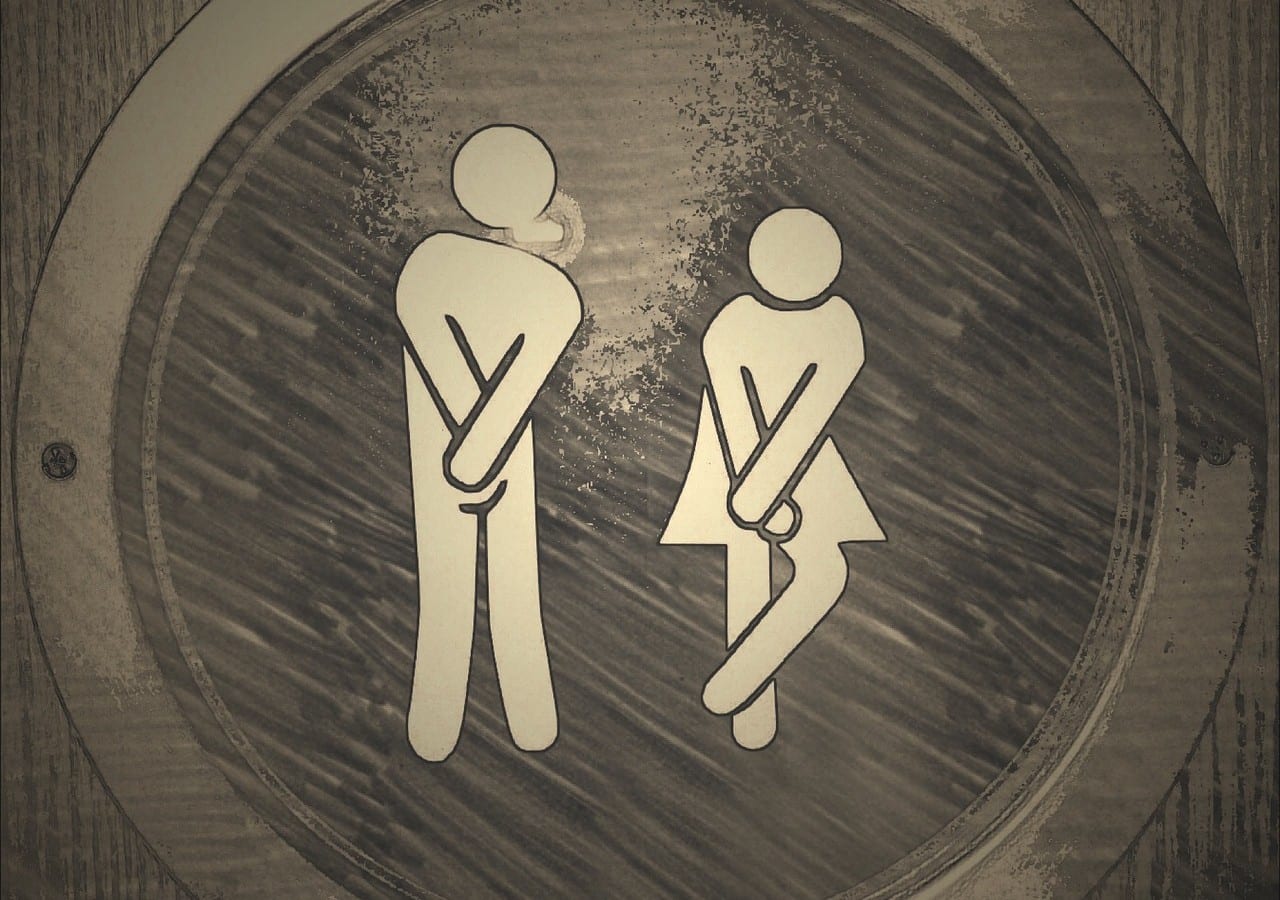And Dealing with the Shame of its Symptoms
At 25, having been pretty healthy all my life, I suddenly started to pass blood when I went to the toilet. Despite the shock and worry, I quickly had it checked out and was diagnosed with Ulcerative Colitis. For those of you who have no idea what this is, it is an embarrassing and incurable condition involves ulcers forming on your colon, which makes you terribly bloated, unable to process food well and worst of all it leads to big problems controlling your bowel movements. Although it is hard for me to write this so openly, I want to share my story to let others suffering from the same condition know they are not alone.
It was terrifying to be told at such a tender age that I had an incurable disease. It was almost impossible to process the fact that I could be incontinent and end up with a colostomy bag at just 25, with my whole life ahead of me! I didn’t know how to react. Should I fight it, give in, or just struggle on through it? It was a dark and scary time with lots of ups and downs, but I am here to tell you that I got through it and beat this terrible condition.
Following the diagnosis I had to undergo a series of invasive tests, unsympathetic doctors and a bleak diagnosis. I felt hopeless, resigned to being ill and isolated.
I was embarrassed to tell even my closest friends or family what was really going on. Sure they knew I had Ulcerative Colitis, but they didn’t know that frequently I couldn’t control my bowel movements, I was just too embarrassed to say it out loud.

Why is it so difficult to talk about going to the toilet as an adult? We’re full of potty talk when it comes to our children after all. It’s as if we’ve trained ourselves as adults to feel ashamed if we don’t make it to the loo; as if it’s a personal failure, rather than our body not working properly. Trust me, I was feeling very ashamed!
For more than two years the toilet was red with blood every time I went to the loo, and I was on the toilet at least every hour. For more than two years I had problems getting to work as I had to jump off the bus during my commute to rush to the toilet. That feeling of not making it and having to hold it in with every muscle in your body was horrendous.
Those two years felt like a lifetime.
It wasn’t long before I became seriously anaemic. I had no energy and found it hard to undertake daily mundane tasks. Even climbing the steps at the tube stations felt like an unending challenge.
Ulcerative Colitis made me a shadow of my former self. But these symptoms I could handle. What I couldn’t handle was the constant fear of being caught short during the awful times when I knew I couldn’t make it to the toilet. These memories plague me, even now.
My worst experience was working at a posh event and not making it to the toilet in time. I rushed into the loo, locked the door, crying with shame. I was stuck in that cubicle with no idea what I was going to do to hide what had happened.

I didn’t feel I could call anyone, or tell anyone, or even make my excuses to leave, so I just cleaned myself up the best I could and tried to pretend nothing had happened. You know, I feel sick and ashamed just writing this? Crazy!
Looking back on it, I find it astonishing that I carried on as normal, but I still went to work every day, met my friends in the pub and tried to live as full a life as I could. A lot of the time I was just dragging myself around, but I kept doing it because I didn’t feel there was another way and the doctors didn’t give me hope that I could really get better.
Although it was horrific, I feel proud now that I didn’t just give up, take sick leave and stop my life. Even though that would have been the easiest thing to do.
It is not hard to imagine why some people can become house bound and agoraphobic. Leaving the house removes your control of the situation and increases your distance to a bathroom, so any trip could end in humiliation.
I personally didn’t feel that barricading myself at home was an option, but I knew I needed to do something. I needed both medical help and someone who cared and understood what I was going through and I wasn’t getting this from the NHS, so I sought alternative treatment.
I tried acupuncture first and while I don’t think it helped the symptoms much, I am so glad I did it. The most important part of my weekly sessions was to be able to tell someone what was happening and for them to be sympathetic. When my acupuncturist said “Poor you, that sounds awful” it was amazing – no one had given me permission to feel bad about what I was going through. Every other doctor made me feel I was making a fuss and just had to deal with it, so having someone share my pain was really liberating!

As well as the care and comfort, the advice and encouragement to take control of my condition was brilliant. My acupuncturist encouraged me to figure out what was affecting me, experiment with diet and stress management, and avoid solely following conventional wisdom when it was clear it wasn’t really working for me…
The doctors don’t understand Colitis, so following your own path makes sense. After trying a few things, it was Chinese medicine which really helped me. This drastically reduced my symptoms, improved my well-being and almost brought me back to my old self.
Getting that bit better gave me the confidence to go back to the doctor and ask for better medication. It showed me that something could be done and I wanted more. Although I was too wrapped up in emotions to assert myself in the way I’d planned… instead I broke down in tears in my doctor’s office… until I got referred to a good specialist. Crying does work sometimes!
I also took back control and decided to start living again. I went against doctor’s orders and traveled to Peru to live and work for a year. I refused to accept that at such a young age I couldn’t do what I wanted. I refused to be defined and limited by my condition. I dealt with everything that the illness threw at me. That was really liberating!

During the second course of treatment I started to feel better, but I was still suffering and hated the medication I was taking. Let’s face it, when you’re dealing with ‘that part’ of the body the treatment isn’t going to be as simple as popping a pill!
My attitude of getting on with it was allowing me to live a “normal” life, but the problem with that approach is that you don’t demand to be cured, or even expect it; you just deal with what you’ve got. This kind of attitude gets you nowhere fast.
It wasn’t until I moved to Spain and met my boyfriend that he refused to accept that this was just something I had to deal with and started searching for answers. He went on every forum there was, looked into every diet and course of treatment and would not take no for an answer. He had a determination that I had long ago lost. He made me see I shouldn’t be living like this and that I must demand better.
Together we found an amazing specialist who has managed to get my condition virtually into remission. The specialist told me that the medication I was taking and accepting to be the best was in fact outdated. Not only that, but he gave me every confidence that we would find the right treatment together. This lovely doctor gave me the courage to tell him what I thought about my condition. He let me find my voice and tell him that, although I was going to the toilet 20 times a day, I thought I was actually constipated at the start of every flare up.
This seemingly crazy idea was the key to starting to manage my condition. If I take soluble fibre drink when I am flaring that really helps. It makes no sense and is against all the conventional wisdom, but seems to work for me. This particular doctor was open to any ideas, let me talk and wanted to work with me to find the solution.
After trying three different treatments, including an immune suppressant that brought me to my knees, I now have a tailor made course of treatment.
I take Mesalazine tablets every day, have a generally low fibre diet and when I flare up I take a soluble fibre drink and a Mesalazine enema for 7 days. I know stress flares me up, so I try to deal with that the best I can – with mixed results (well, I am a mum and a business owner). But the best thing is that now I know I can deal with flare ups when they come… which is fortunately only a couple of times a year.
All of this has taught me a valuable lesson. It’s an amazing strength to be able to get on with life despite your health issues, worries or personal situation. But sometimes you do need to say things are unacceptable and go for that second or third opinion.
Do your research, take control and don’t stop pushing until you’ve exhausted every option. You could be living with something that could be cured or solved with the right help. Don’t be a martyr!
It has also taught me that you shouldn’t be suffering alone. Even the most embarrassing symptoms are easier to deal with when you let people in. Sharing my story has been hard for me, but we need to speak up. If YOU are suffering like this, please tell people. It may be embarrassing, but people who love you don’t mind and won’t judge. Your friends and family will want to help you, so let them. Good luck and please believe you can get better!
(Note from The Editor. Many thanks to Georgina Shaw for being so open about her struggles. Georgina is Director and Founder of Shaw Marketing Services on the Costa del Sol in Spain, providing online and offline marketing, PR and design services, copywriting and blog writing. You can read more about Georgina and her business over on her Facebook or Twitter pages or author page here.)








